GHOST, ORBS AND PARANORMAL PAGES
TIME TRAVEL PAGES COOL STUFF!!
NEW EARTH SHOTS NIGHT TIME EARTH LIGHTS!! A MUST SEE!!
ELDRIDGE PHILADELPHIA EXPERIMENT
TIME TRAVEL LINKS 2 PAGES OF COOL LINKS!!
PROJECT HAARP IS THIS MIND CONTROL??
MUSIC R&D FOR MK AND REPRODUCING THAT TONE
MK MIND KONTROL AND MIND CONTROL
USE THE NEW LINKS BELOW:
PRELIMINARY PATENT DESCRIPTION "BATTERY" Docket Number 1687
T. Townsend Brown
DESCRIPTION:
This invention relates, in general, to a new and unique method for generating electricity. In particular, it relates to a type of battery which, unlike other batteries, is not powered by chemical action. While it functions as an electromotance, it is not its own (self-contained) source of energy. While the physical principles underlying this invention are not clearly understood, it is presently believed, supported by other evidence, that the energy source is extraterrestrial, coming to the Earth from cosmic space in the form of penetrating gravitational radiation. It is believed that this gravitic radiation coming from cosmological sources is of ultra-high frequency, extending possibly into the angstrom range.
Strictly speaking, while this invention may be classified for patent purposes as a new form of "battery" - it could more accurately be termed an "energy converter" or a gravitovoltaic device. From the practical operational standpoint, however, it is appropriately referred to as a battery.
The active ingredient of the subject battery is a massive high-K dielectric material, such as heavy metal oxides or carbides. For the sake of clarity in this patent application, tungsten carbide (specific gravity 17.0) is selected as one of the best, if not the best, active ingredient to use. Heavy metal oxides such as lead monoxide (litharge), osmium or barium compounds or the like may be used with similar results. The electrical output is conducted from the said active (receptor) mass by suitably placed electrodes. This output is observed in the form of a DC self-potential.
SPECIFICATIONS:
Figure 1 is a perspective of the said battery, showing insulated enclosure 1 containing a volume of heavy powder 2 such as tungsten carbide with a binding agent, together with electrodes 3 and 4 attached thereto and leads 5 and 6 to conduct the generated current to external load 7.
Figure 2 is a circuit diagram of Figure 1 showing additionally the means to polarize the battery initially. Polarization voltage is supplied by high voltage source 8. Voltage is supplied only while the mixture is cooling and/or hardening. This circuit is then disconnected.
It is necessary, initially, to polarize the battery in order to orient the dipole molecules and align the particles of powder so that output EMF is additive. This alignment of dipoles or polarization, induced while the active material is fluid, is retained and persists after the active material cools or hardens.
The battery is constructed in the following steps:
- Tungsten carbide powder is mixed with molten carnauba wax or other suitable binder and the heavy mixture poured into insulated container 1 and allowed to cool or harden.
- During cooling, a high voltage is placed across electrodes 3 and 4 as shown in Figure 2, so as to electrically polarize the mixture. This polarization is necessary so as to permit subsequent energy (gravitovoltaic) conversion from the incident radiation.
- Following polarization, cooling and solidification, the battery is ready to operate and will continue thereafter to generate self-potential with integrated power far in excess of the power required for polarization. It is observed in tests extending over many years that, whereas the output undergoes diurnal and secular variations, it does not permanently diminish or disappear. In other words, the evidence to date is that this form of battery has no fixed life, as other (chemical) batteries, but continues to generate electricity indefinitely.
While I have in the foregoing specifications referred to tungsten carbide and carnauba wax as preferred ingredients, it is to be clearly understood that other massive high-K dielectrics and plastic (or other) binders may be utilized without departing from the spirit of the invention as intended to be covered in the hereto appended claims.
CLAIMS:
- Method of generating electricity consisting in utilizing a mass of tungsten carbide powder, binding said powder in a suitable semi-conductor, polarizing said mass by applying high voltage thereto while said binder is hardening and utilizing collector electrodes and leads attached thereto to conduct away the generated electricity.
- Method of generating electricity comprising mixing powdered tungsten carbide with molten
carnauba wax, allowing said mixture to harden within an intense electrical field, removing
said field and utilizing the perpetual self-potential of said mixture to energize an
external load.
Inventor
T. Townsend Brown
Sunnyvale, California
April 28, 1976
Figure 1
Figure 2
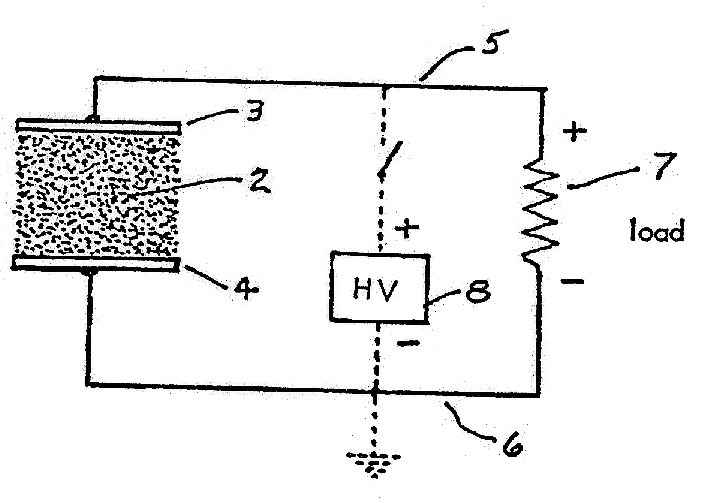
Partial PRELIMINARY PATENT DESCRIPTION "Rock"
T. Townsend Brown
BACKGROUND:
Careful observations, conducted over a period of years, have revealed the existence of a "steady state" electrical self-potential spontaneously developed by certain semi-conductors. Exploratory work with various semi-conducting material has revealed massive high-K dielectrics, being heavy semi-conducting materials with high dielectric constant, produce the greatest self-potential. Solid dieliectrics such as barium titanate, lead zirconate titanate and certain natural rocks (granite, basalt, etc.) are found to produce this electrical self-potential. The origin of the self-potential referred to in this application is believed to be not hitherto known or identified. It is not piezoelectric, pyroelectric or electrochemialc in origin.
Whereas, it appears to be a fact of nature that rocks and similar dielectric and semi-conducting materials spontaneously produce electricity, it is the purpose of this invention to apply the means to extract that electricity so that it may be utilized. This application specificially excludes piezoelectric (pressure related) and pyroelectric (heat related) effects commonly observed in materials of this type and well known in the art. This application relates exlusively to the phenomenon of "petroelectricity" (a new terminology) which is relatively "steady state" and not dependent upon temperature, pressure or chemical action. The origin of petroelectric energy is not presently known. It is obvious that this energy does not reside in the material itself but must, it appears, have an external, perhaps even extraterrestrial origin. Incident radiation from space (neutrino flux or optical-frequency gravitational radiation has been proposed) but, at present, no adequate explanation exists.
The earmarks of the incoming radiant energy which appear to cause the petrovoltaic effect are the clearly-evident diurnal cycles and occasional strong pulses of short duration. A research program is presently underway to study the possibility that a new energy source (perhaps cosmic in nature) may have been discovered.
This invention relates to the method of tapping the self-potential generated by such dielectric or semi-conducting material. It relates to the placing upon, or attaching thereto, of electrodes upon such material so as to conduct away and utilize the electrical potential developed therein. It relates to the preparation of the dieleectric surface so as to effectively receive said electrodes. The invention further relates to the use of conductors or circuitry to convey said electrical energy from said electrodes to the ultimate (end-use) of said electrical energy.
I claim:
- Method for making available for utilization the electrical self-potential exhibited by massive high-K dielectrics, other than that from piezoelectric, pyroelectric or electrochemical action, consisting in attaching electrodes to said dielectrics, attaching conductors to said electrodes and conveying the electrical potential to a useful load.
- Method for removing and utilizing the electrical potential from petrologic materials, other than that from piezoelectric or pyroelectric or galvanic sources, consisting in attaching electrodes to said materials, connecting conductors to said electrodes and conveying said electrical potential to a utilizing load.
- Method for removing for purposes of utilization electrical energy from rock-like materials, other than that from kinetic, thermal or electrochemical sources, consisting in attaching conductors to said electrodes and conveying said electrical energy to a utilizing load.
- Method of extracting electrical energy from massive high-K dielectrics, other than that produced by mechanical strains, heat or electrochemical conversion, consisting in attaching electrodes to said dielectrics, providing conductors from said electrodes thereby to convey the extracted electrical energy for utilizationin a load.
- Method of utilizing petroelectric energy, other than that derived from piezoelectric, pyroelectric or galvanic sources, consisting in attaching two or more electrodes to a rock, applying conductors to said electrodes and removing the petroelectric energy to a useful load.
- Method according to Claim 1, consisting of two or more dielectrics wired in series to provide higher voltage.
- Method according to Claim 1, consisting of two or more dielectrics wired in parallel to provide higher current.
- Method according to Claim 1, consisting of dielectrics formed from barium titanate, lead zirconate titanate, lead monoxide-glycerine compound or other high-density high-K material.
Inventor
T. Townsend Brown
8/19/1976
Figure 1
Figure 2
Figure 3
Figure 4
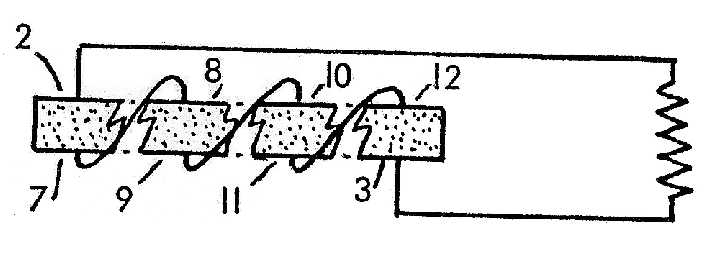


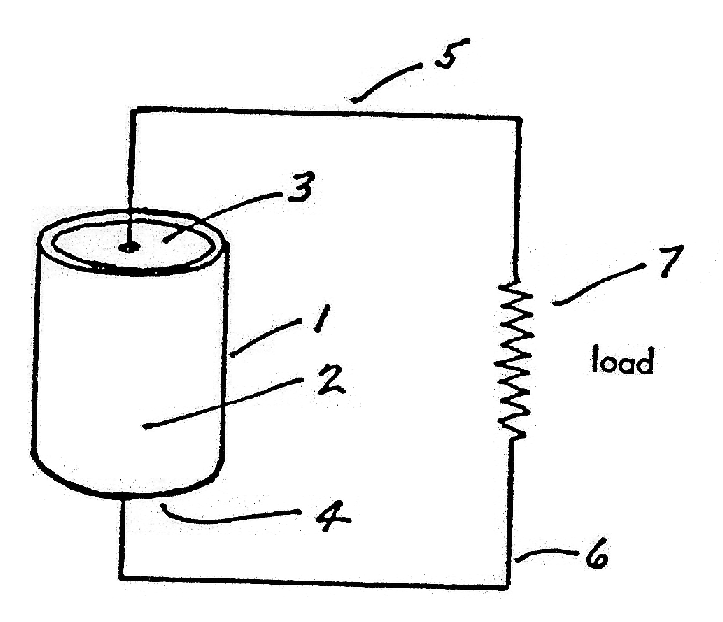
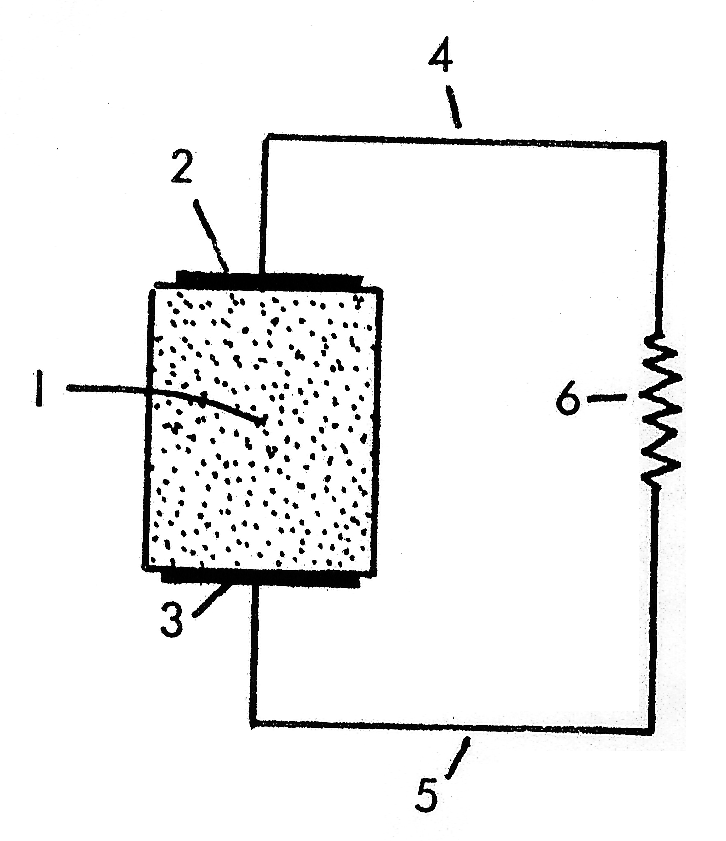
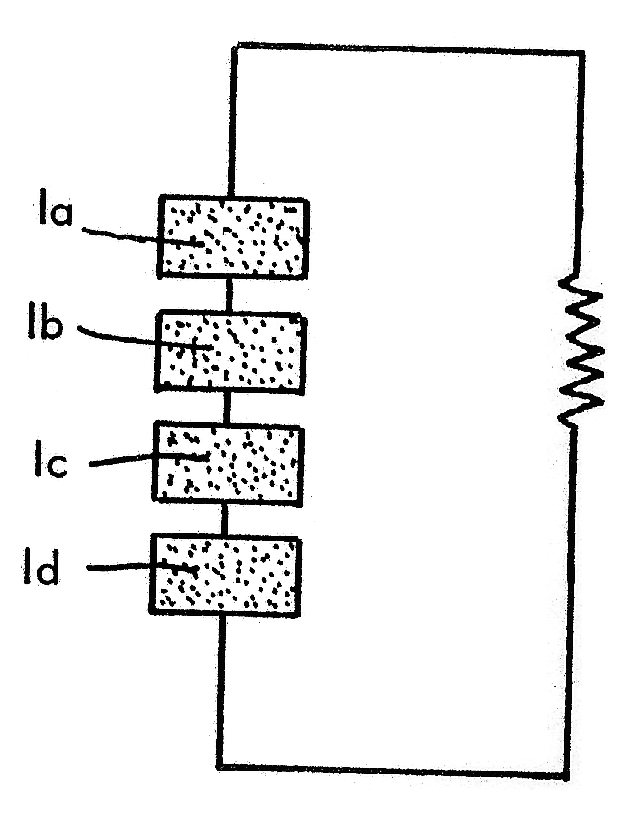
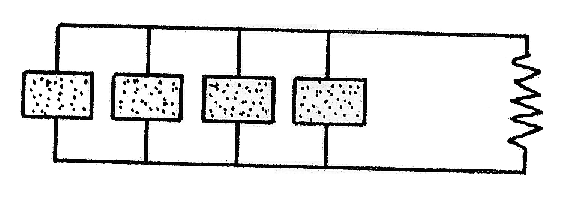
![[Most Recent Quotes from www.kitco.com]](http://kitconet.com/images/quotes_7a.gif)



